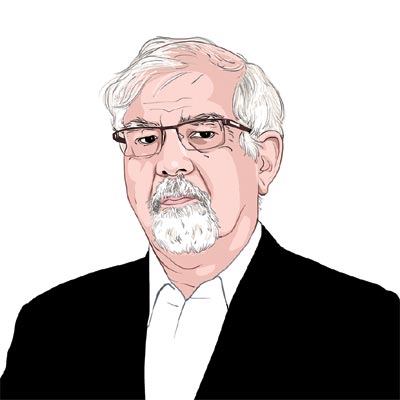Opinion BCCI,FSB: Spot (fix) the difference
The fact of corruption is obvious in both cases,but the politicians in charge naturally prefer a cover-up
The fact of corruption is obvious in both cases,but the politicians in charge naturally prefer a cover-up
As we go to press,it still is unclear whether the UPA government will take the extraordinary step of issuing an ordinance to ram through the food security bill (FSB). Over the last week,the cricket loving Indian public has been witness to a governance failure of extraordinary proportions. The BCCI met,and decided,that short-term self-interest and self-preservation was of paramount importance. Ethics,governance,conflict of interest,corruption,bribery,spot-fixing it just did not matter what evidence the police or the citizenry brought to bear,the reaction to the fans was the same,go jump. This feudal BCCI reaction is identical to the behaviour of the UPA in pushing through the FSB. But first,some discussion about the merits,and demerits,of the FSB.
The FSB is a large extension of the public distribution system (PDS) that has been in operation in India for the last 40 years. The UPA has an obscenely arrogant habit of camouflaging old bad populist policies and branding them as its own invention. It did this with the employment guarantee programme in 2005-06,when it reinvented and expanded the food-for-work programme that had been in operation since 1973. It is now doing the same by asking for a food security bill when the policy of highly inefficient government provision of food has been in operation since the mid-1970s. Of course,the Congress is singularly fortunate in having an inept and equally populist opposition in the form of the BJP,which is ever too eager to rubber-stamp these populist measures.
The advantage of the Congress reinventions is that,by definition,there is a historical record to assess how well the past programmes have worked. The record shows they have not worked at all well. The irony is lost on the Congress leadership,and in particular its president,that it was her own late husband,Rajiv Gandhi,who,as prime minister,had declared that public distribution programmes,particularly of the food distribution type,were corrupt and infested with considerable leakage. His conjecture of the leakage was 85 per cent,that is,only 15 per cent of the money meant for the poor actually reached the poor.
But that was almost 30 years ago. Certainly,the situation must have improved since then as India has become richer,gained more experience and become less corrupt. All-India National Sample Surveys have been asking questions about food consumption and the source (PDS or non-PDS) and price of purchase since 1983. Reported below are some statistics from the latest available 2009/10 survey. It would be worthwhile if the principal (but not principled?) opposition party,the BJP,were to look at these figures,but I realise that that might be expecting a bit too much.
According to government accounts,it spent Rs 60,000 crore (Rs 58,500 to be precise,but numbers are rounded up) on the PDS system in 2009/10. The NSS data reveals that the poor received Rs 14,000 in the form of subsidised food (primarily wheat and rice) and the non-poor (almost 70 per cent of the population,Tendulkar poverty line definition) received Rs 23,000 crore. An equal amount,Rs 23,000 crore,went for administration of this system. So the poor received (14,000 divided by 60,000) only 23 per cent of the money spent on their behalf.
Another way to look at the existing PDS programme is to examine the cost of poverty removal. Calculations suggest that operation PDS lifted about 30 million out of poverty,that is,because of the food subsidy received by the poor,30 million individuals became not-poor. In 2009/10,the average consumption of the poor was 20 per cent less than the poverty line of approximately Rs 800 per person per month. Which means that it took only Rs 160 a month,or Rs 1,920 a year,to help the average poor person become non-poor. For 30 million such individuals,the expenditure needed was,therefore,Rs 5,760 crore. The government spent exactly 10 times the amount.
Surely,this money could have been better spent for the poor. Surely,this is a statistic that the BJP can use in opposition to the FSB. Almost surely,they will not use this,or any other evidence,to object to the bill. Because when all is said and done,there is not a rupee difference between the Congress and the BJP.
A better understanding of the political economy of the BJP and the Congress can be gleaned from the just-concluded BCCI meeting. Just notice the following three parallels. The BCCI meeting did not conform to any known standards of governance; as the above evidence makes abundantly clear,neither does the PDS,and nor will the FSB. The objective of the BCCI is to provide a non-corrupt environment for cricket and to be above-board in its accounts. Both the BJP and the Congress opposed tooth-and-nail submission to Right to Information scrutiny,just like the BCCI. Even important officials of the BCCI,BJP and Congress are the same Arun Jaitley and Rajeev Shukla at the just-concluded BCCI cover-up seemed like twin brothers protecting the family fortune.
In the interests of the poor,and cricket,there are straightforward solutions. At present,India spends upwards of Rs 2,00,000 crore on subsidies meant for the poor. The poor probably receive no more than a tenth of such subsidies. Alert the poor do not drive diesel-powered SUVs,and if they cant even access subsidised foodgrains,even god cant help them with the other subsidies. Most certainly not with the principled BJP and Congress lot that infest our Parliament.
Think about it: Rs 2,00,000 crore well targeted at the bottom third of the population will mean Rs 6,000 a year,or Rs 16 extra per day for each poor person a near 50 per cent increase in the per day consumption of the poor. Certainly worth a try but it wont happen,because there are too many political parties,and politicians,who profit from the present non-transparent and non-accountable procedures. Yet another parallel with the BCCI.
The writer is chairman of Oxus Investments,an emerging market advisory firm,and a senior advisor to Blufin,a leading financial information company





